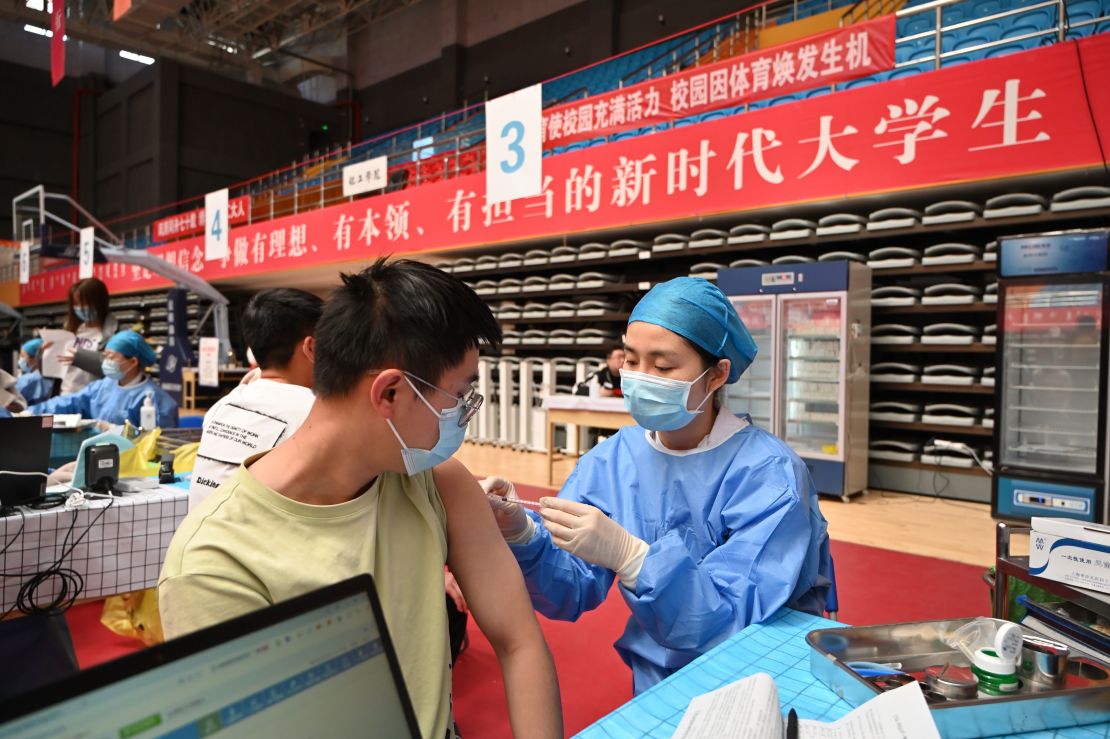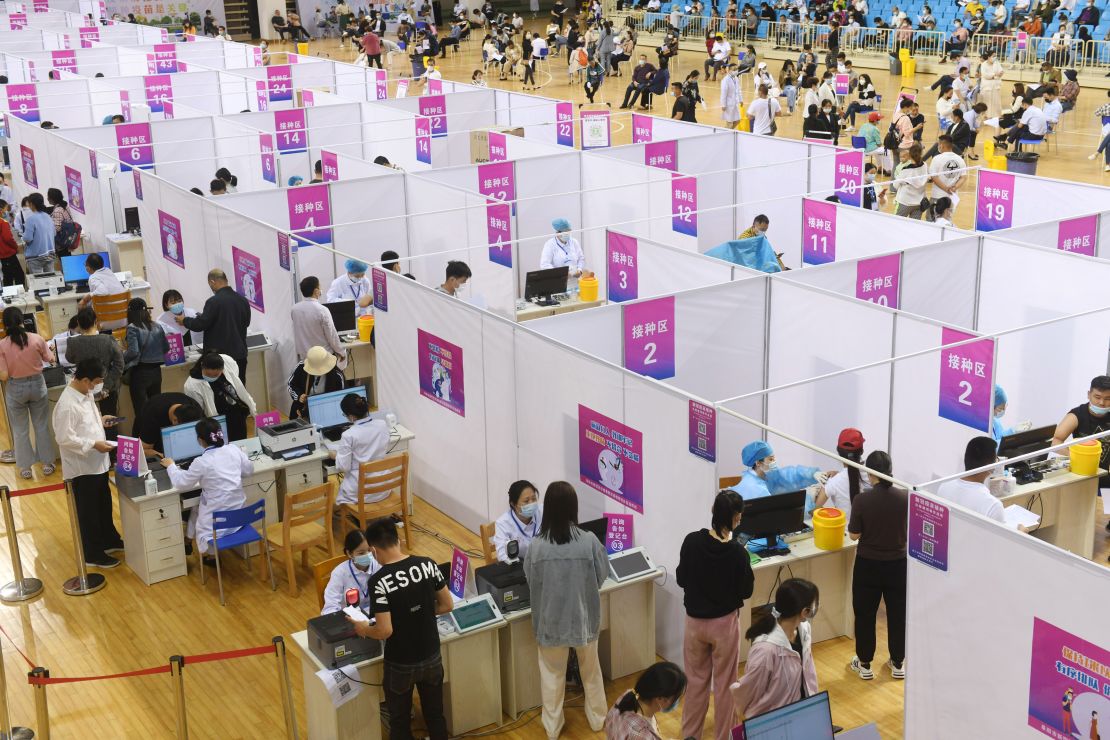Unvaccinated residents in parts of China will be banned from accessing public services including hospitals, schools and nursing homes, as the country targets an inoculation rate of at least 80%against Covid-19.
Over the past week, dozens of county-level governments in at least eight provinces have published notices warning citizens they have until late July or early August to receive their vaccinations, after which they will face a variety of restrictions on everyday life.
“Everyone is responsible for the prevention and control of the epidemic, and vaccination starts with me!” read one notice issued this week by Dingnan county in Jiangxi province, which is home to about 220,000 people. The notice added that “in principal” unvaccinated residents would be denied access to schools, public transport and medical facilities, among other amenities and services, starting from July 26.
The push by local governments to boost vaccination rates comes as the ruling Communist Party outlined its goal of achieving so-called “herd immunity” – the point at which enough people have either been infected or vaccinated to end community transmission – by December this year.
Shao Yiming, an epidemiologist with the Chinese Center for Disease Control and Prevention, told state media that given the protection rate of Chinese vaccines is below 100%, China will need to fully vaccinate 80% to 85% of residents, equivalent to 1 billion of the country’s 1.4 total population, in order to meet the December deadline.
With China having largely contained the virus’ spread, many residents initially saw little need to get vaccinated. A history of safety scandals involving domestic vaccines also contributed to public hesitancy. However, several recent local outbreaks, including in the northern Anhui and Liaoning provinces, and Guangdong in the south, have fueled fears of infection, prompting a rush to get vaccinated in affected regions.
And across the country, the vaccination rate has accelerated in recent months, with more than 10 million shots administered per day on average. As of Wednesday, the Chinese government had administered 1.4 billion Covid-19 vaccine doses, according to state media estimates, though it remains unclear as to the total percentage of the population who have received two shots.
The all-out campaign has seen government workers descending on neighborhoods in efforts to convince people to get vaccinated, with vaccination sites offering benefits, ranging from shopping vouchers to free groceries and ice cream.
But experts cautioned that many residents who have yet to receive a single dose would be harder to reach, especially in rural areas, leading local governments to take more drastic measures to ensure herd immunity.
“All those strategies they used to entice people to get their vaccine … may not work in this next stage of vaccination efforts,” said Yanzhong Huang, senior fellow for Global Health at the Council on Foreign Relations.
“Making it mandatory may be the only workable solution to the problem,” he added.

Bans on entry
In the first two weeks of July, at least 50 counties across 12 Chinese provinces issued notices warning of strengthened measures to encourage unvaccinated citizens to get their shots, adding that “not being vaccinated will affect life and going out.”
To date, notices of new measures have been posted in Sichuan, Fujian, Shaanxi, Jiangsu, Jiangxi, Guangxi, Anhui, Shandong, Hebei, Henan, Zhejiang and Inner Mongolia.
Most of the areas imposing the measures are relatively small by Chinese standards – the largest is Zaozhuang City in Shandong province, which has a population of 4.2 million people. The first of the measures was announced on July 8 with new notices still being posted as of Friday.

The policies vary greatly from place to place – in 33 of the counties, the authorities said vaccination records will be checked on entry to public facilities, including administrative buildings and health facilities, and citizens who have not received their shot will be encouraged to do so.
But in 19 counties, the local governments have explicitly warned that within weeks, unvaccinated citizens could be banned from a wide range of public places and services.
“Starting from July 17, in principle, people who have not been vaccinated … are not allowed to enter key places such as inpatient departments of hospitals, nursing homes, schools, libraries etc.,” said a notice posted in Sichuan’s Jingyan district, adding it would make an exception for those with a legitimate health reason for avoiding the vaccine. The notice also said unvaccinated supermarket employees and market stall owners would be barred from their jobs.
In a few counties the measures are even more extreme. In Guangxi, two cities – Guiping and Beiliu – both said students would not be allowed to go to school unless both of their parents were fullyvaccinated. After vocal opposition on social media, the notices were deleted although it is unclear if the restrictions will still apply.
And in Tanghe county, in Henan province, state media reported that local government agencies would stop paying employees, or workers at state-owned enterprises if they refused to get vaccinated.

Test balloon or official pressure?
Chinese officials are not alone in ordering vaccinations for certain key workers, or banning access to those who haven’t received shots. French President Emmanuel Macron has ordered all health workers to get vaccinated at the risk of losing their jobs, while proof of two shots will be required to enter hospitals, restaurants and some forms of transport in France from early August.
Similarly, the Australian government has mandated all aged care workers must have received at least one Covid-19 vaccine shot by mid-September.
But these are the first such measures in China, leading to criticism, with some worrying the restrictions are a forerunner to nationwide mandatory vaccination.
Writing in the state-owned China News Weekly, Shen Kui, director of the Research Center for Human Rights and Humanitarian Law at Peking University, questioned the legality of the measures, which he likened to de facto mandatory vaccinations.
“Unvaccinated people will face various barriers in living and working under the policy. The only way to avoid these obstacles is to get the vaccine. If it’s not force-vaccination, what can it be?” asked Shen.
“Before mandatory Covid-19 vaccination becomes a legal requirement, there is no legal basis to enforce such restrictions,” he added.
An editorial about the new measures for schoolchildren in Guiping, posted on the popular online news site Sohu, said ignoring citizens’ right to not take the vaccine was a “betrayal and abuse of people’s trust.”
“As a local administrative department, it should respect the people, advance and retreat with the people, and build a united epidemic prevention front,” the editorial said.
To date, China’s central government has not formally mandated vaccination against Covid-19. Jin Dongyan, professor of precision medicine at Hong Kong University’s School of Biomedical Sciences, said the policies were likely the result of local government officials under extreme pressure to deliver on Beijing’s vaccination goals.
Under the Chinese government’s top-down administrative structure, policy edicts are often laid out by the country’s leadership and then left up to local officials to decide how to implement them. Failure to meet the policy targets could cost local politicians future promotions or even their jobs.
“They have to deliver and they will use all means at their discretion and they will try all available options,” said Jin.
But Council on Foreign Relations’ Huang questioned whether the new policies were the overzealous work of local government officials under pressure to deliver on vaccination targets, or a test balloon being floated by the Communist Party in Beijing.
The Chinese government has a long history of trialing potentially controversial initiatives at a local level before introducing them nationally to see how it will be received by citizens, said Huang.
“Maybe this is a central government initiative,” he said.
Huang added if Beijing wanted to make sure China could maintain herd immunity, it might have to make the vaccine mandatory whether it was a popular measure or not. “For any vaccines with efficacy rates lower than 80%, you need to have the entire population vaccinated,” he said. “Simply asking people to get the vaccine is not going to achieve that.”
China has approved five domestic vaccines for use – two developed by state-owned Sinopharm, and others from Sinovac, CanSino and Anhui Zhifei – with the majority of the population receiving either Sinopharm or Sinovac shots.
So far, trials show Sinopharm and Sinovac have a lower efficacy against Covid-19 than their mRNA counterparts. In Brazilian trials, Sinovac had about 50% efficacy against symptomatic Covid-19, and 100% effectiveness against severe disease, according to trial data submitted to the World Health Organization. Sinopharm’s efficacy for both symptomatic and hospitalized disease was estimated at 79%, according to the WHO.
CNN’s Nectar Gan and Yong Xiong contributed to this report.


















